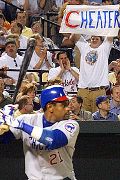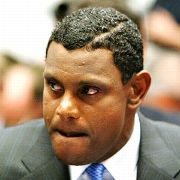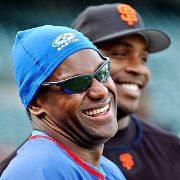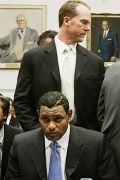|
A saying exists in baseball that the smartest person in any clubhouse is the guy with either the highest batting average or the most consecutive zeroes on his paycheck. In other words, the superstars -- smart or dumb; black, white, Latino or Asian; old or young -- run the show. They control clubhouse thought through the intimidation of their talent. Everyone without their ability either falls in line or risks the kind of peer-pressurized alienation most of us escaped moments after graduating from high school.  Keep that in mind as you consider the New York Times report that Sammy Sosa is one of the 104 players who tested positive for performance-enhancing drugs in baseball's 2003 survey testing because the news should not be met with an indifferent yawn, as if Sosa is just another in a long line of Hall of Fame-caliber talent biting the dust: Alex Rodriguez, Manny Ramirez and now Sosa, all in the first half of the 2009 season alone. Instead, this news should be greeted with the kind of outrage reserved for the worst breaches of trust because you, Mr. and Mrs. Fan, have been taken for a very special kind of ride. For years, the discussion about performance-enhancing drugs has existed within a structure that always has benefited the players. In the late 1990s, there was the argument that steroids did not exist in large measure, that players were the victims of a "witch hunt." Then, as high-profile players began to get caught using steroids and a league-administered drug policy was implemented, the new paradigm was that Player X could not be suspected because he had never failed a drug test. By now, that con game has been exposed completely and a new argument -- let's call it the "Alex Rodriguez Defense," used by players, fans and, unfortunately, some Hall of Fame voters -- has surfaced. This one suggests that these steroid-using superstar players were merely "caught up in a culture." This latest orthodoxy is particularly insulting, for it suggests that the steroids era appeared one day out of thin air -- blamelessly and tragically, like, say cholera -- and that the players were unfortunate victims.  The truth is quite the opposite, for it was the star players who used their power, their influence and their good standing to create a steroid culture. It is one thing to lie, which is bad enough, but what these players have done is infinitely worse. They have lied, convinced that their good will and celebrity -- and batting averages -- would allow them just enough dispensation to get away with it, to drown out anyone not taken in by their false charms. They knew that the fans would be more than forgiving, that the fans, in fact, would be determined soldiers against any negativity, even if that negativity happened to be the truth. Never mind Barry Bonds' actual transgressions; some fans in San Francisco even feel vindicated by the spectacular fall of Roger Clemens and Ramirez and, now, Sosa, as if it is proof that their man was disproportionately targeted by the government, media and public. Even as the card house collapsed, the players knew the fans were just red-blooded capitalists who would forgive lying and cheating because there was big money at stake. How many times have we all heard the old saw? "Well, what would you have done for $10 million? You would've done the same thing." Think about the times you've been brazenly lied to, right to your face, by people who used their "integrity" to fool you. Bill Clinton said, "I never had sexual relations with that woman." Even for a relatively common transgression, a country felt betrayed, never mind how it felt being misled into a disastrous war by straight-faced untruths from his successor. The Alex Rodriguez-Katie Couric, Roger Clemens-Mike Wallace, Sammy Sosa-Dan Patrick moments hold -- at least in the baseball universe -- the same standard of the powerful using their position to fool the public.  When this attitude was coupled with an era when powerful entities ranging from the White House to the military to the blogosphere have skillfully turned the mainstream media into the ubiquitous enemy, the players knew the strategy all too well: They used the fans' loyalty against them. They smiled. You fell for it. That was all it took. Ironically, it is the Phillies' Raul Ibanez, burned by a blogosphere that does not have to adhere to traditional journalistic standards, who now turns back to the mainstream media -- with all of their supposed "agendas" -- to defend his name. Far from the sports page, in the book section of the Times, Pulitzer Prize-winning critic Michiko Kakutani reviews two books about the roots of the nation's financial crisis that mimic the attitude of baseball players. Under the headline, "Greed, Layered on Greed, Frosted with Recklessness," Kakutani writes, "To put it another way, the crisis was, in the words of the Newsweek business columnist Daniel Gross, 'a man-made product that turned out to be immensely toxic and damaging' -- not, as so many in the 'Smart Money crowd' insisted, 'a random, once-in-a-lifetime thing that fell out of the sky.'" The fan has been the greatest enabler of the steroids era. Face it: Had the paying customer revolted, the institutional reaction would have been decidedly different. The superstars knew the paying customers were either too forgiving of their golden heroes or too selfish to have their fun and games interrupted (or both) to hold them accountable. But fans aren't the only suckers walking around today. The writers did the same, and continue to do so. Some have decided to use their Hall of Fame votes in the affirmative for the game's great but disgraced players -- Sosa, Bonds, Clemens, Ramirez -- because the players were part of a larger culture.  Yet it is an argument that could not be more offensive. It fails to take into account the willful levels of deceit that allow individual choices to become a collective culture. Some in the media are equally guilty by intellectual laziness, the bait-and-switch thinking of the apologists for whom there is no way out. The nonbelievers of the steroids era first argued that they needed proof beyond innuendo. When the proof came, they wanted it both ways, saying, "Oh, steroids are old news. Everyone knew these guys were using." If the writers have been guilty of lazy thinking, there is, too, the intellectual dishonesty of the players, whose excuses have transitioned from the silly ("There's nothing in a bottle to help you hit a home run" -- McGwire, Bonds) to the nuanced ("I was part of a culture" -- Rodriguez). Both are a cover for a central motivation: They got to keep the money. It is one thing to be taken, quite another to make excuses for the very people who perpetrated this fraud. And it is even worse to reward them with induction into the Hall of Fame. The players got to keep their money. Why should they be rewarded for their deceit? Is this baseball or Wall Street? The cultural intention to defraud is the same. Today, it is not enough for a player merely to say he never used. Albert Pujols already did so on the cover of Sports Illustrated this year. Derek Jeter constantly has protected his legacy by saying "Not everyone is on this stuff." Both might never have used, but the words of Jeter or Pujols have no more value than Sosa's empty challenge to anyone questioning his accomplishments. The real value will come from the superstar who actually uses his celebrity for reform, the star player whose Hall of Fame plaque might actually say "was instrumental in the fight against drug use in his sport." Imagine that. Howard Bryant is a senior writer for ESPN.com. He is the author of "Shut Out: A Story of Race and Baseball in Boston" and "Juicing the Game: Drugs, Power and the Fight for the Soul of Major League Baseball." He can be reached at Howard.Bryant@espn3.com.
|
